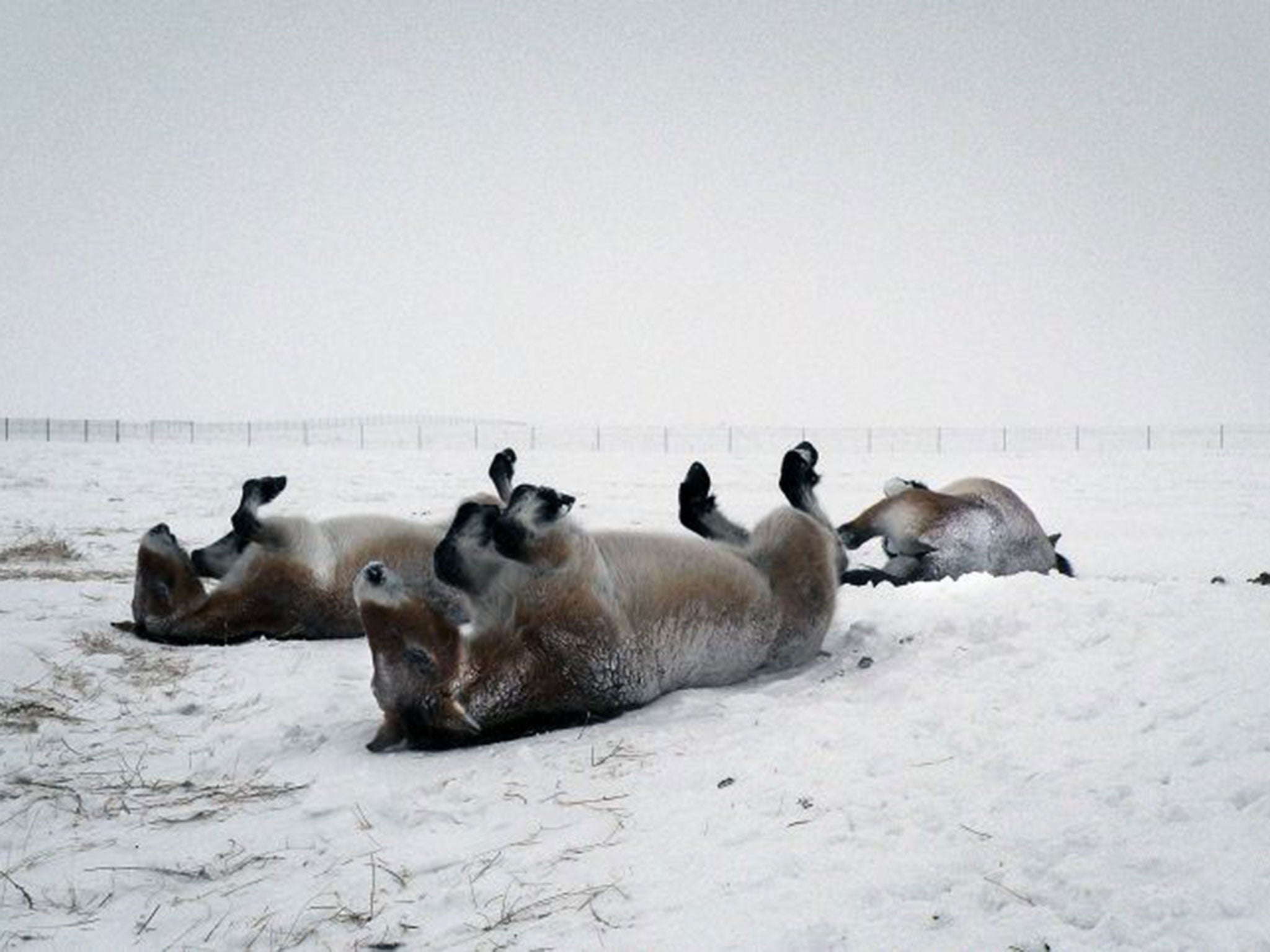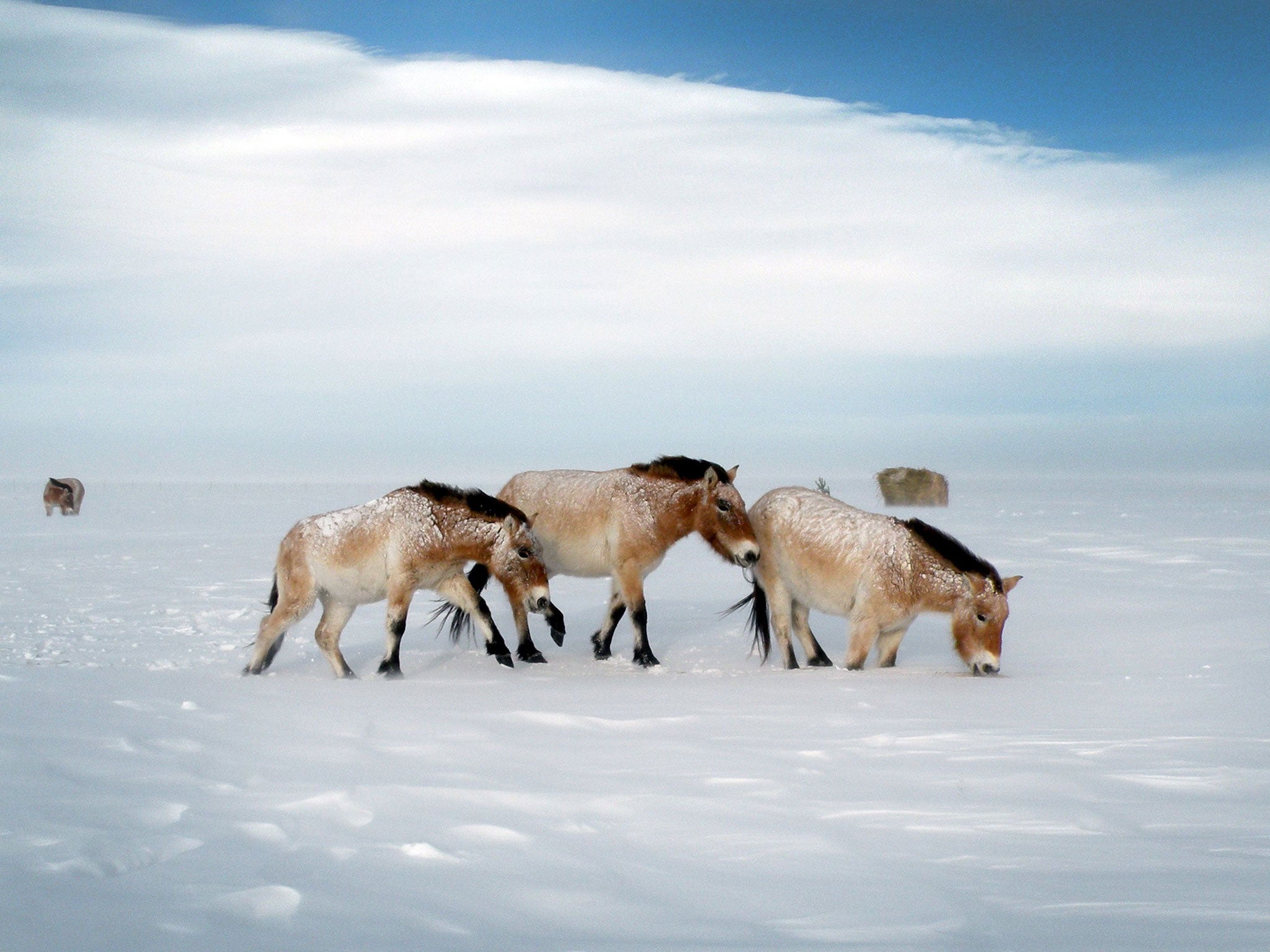Przewalkski's horse brought back home to Russia's wild grasslands
The species is being reintroduced to their original habitat after 20 years of extinction in the wild

In the vast swathes of Russia’s steppe near the border with Kazakhstan, six light-brown horses traipse the snow-covered fields as a security unit watches over them, providing protection from poachers and intruders. With spiky manes and a stocky build, they are Przewalski’s horses, the species being reintroduced to their original habitat after 20 years of extinction in the wild.
First born in the south of France before travelling by plane to Russia’s Orenburg nature reserves, the six are all that remains of the original 10 expected to make the flight across Europe to their new home. Four of the horses refused “flat out”, said Rafilya Bakirova, director of the reserve that hosts the Orenburg programme, Russia’s flagship reintroduction project for the species. Their wild nature was understood immediately, she says, after the four stubborn horses began to fight so fiercely that serious damage to their health was feared.
The reserve spans more than 16,500 hectares, making it the largest continuously protected piece of “virgin steppe” in Russia, according to horse expert Tatyana Zharkikh, who directs the reintroduction programme. Scientists and conservationists hope to see the number of Przewalski’s horses in Orenburg eventually swell to 100.
“They are quite happy,” Ms Zharkikh told AFP. “They are not afraid of wind, snow or cold. If the Przewalski’s horse has enough food, it is practically invincible.” Last summer, four Przewalski’s horses were successfully returned to the steppe in Mongolia’s southern Gobi desert region.

Przewalski’s horses, named after the Russian explorer who first described them scientifically, Nikolai Przewalski, were once native to China and travelled freely across the wilds of the Eurasian steppe covering Russia, Mongolia, Ukraine and Kazakhstan. But they were driven to the brink of extinction after Przewalski’s 19th-century discovery of the species led to an increase in their appeal. Many were killed or captured and taken to zoos across the world, while others were displaced by human land use. Of the 2,000 Przewalski’s horses left in the world today, only 300 live in the wild, having been part of reintroduction programmes first.
20
years of the horse being extinct in the wild as a result of hunting, capture and habitat loss
Their greatest threat, today, however, is not capture but genetic dilution. While the Orenburg project ultimately aims to have Przewalski’s horses roaming free in a borderless nature reserve, for now this poses too high a risk.
If Przewalski’s horses breed with domestic horses, they produce fertile hybrids, which has the potential to quickly adulterate the species and undo the work of the project. So, organisers have decided first to place the horses in a fenced-off area to stabilise the population and fend off the risk of losing their gene pool.
“Even a few hybrids can cancel out all conservation efforts. What’s the point of protection if they are just cute shaggy-haired horses rather than a species?” Ms Zharkikh said.
There is a secondary benefit to the programme. Conservation of Russia’s steppe has long been a concern for ecology institutes across the region, who fear the ecological repercussions of species extinction. “In steppe ecosystems these animals contribute to their recovery,” said the head of the World Wildlife Fund’s Central Asian programmme, Olga Pereladova. “If horses are not grazing in the steppe it deteriorates because vegetation is not trampled; overabundance of grass can cause fires.”
The push to reintroduce Przewalski’s horses to their original habitat was supported by Russian President Vladimir Putin in 2011, who called the revival “a fascinating project” given their extinction in the wild. During his term as the country’s prime minister, Mr Putin personally supervised three projects for the conservation of rare animals, including the Amur tiger, beluga whale and polar bear.
Join our commenting forum
Join thought-provoking conversations, follow other Independent readers and see their replies
Comments
Bookmark popover
Removed from bookmarks